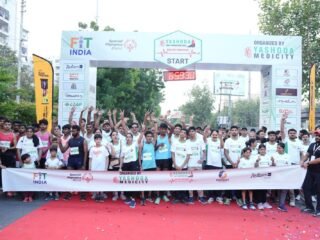New Delhi, 30 May 2025: A recent study conducted by the All India Institute of Medical Sciences (AIIMS), New Delhi, has revealed an alarming rise in childhood obesity among private school students in the national capital. The comprehensive research points to poor dietary habits, lack of physical activity, and increased screen time as the main contributors to this surge. Even more concerning, experts warn that this growing trend of obesity in children is directly linked to early onset heart diseases.
Delhi’s Private School Kids Facing a Growing Obesity Epidemic
According to the AIIMS study, which surveyed over 3,000 students from various elite private schools across Delhi, nearly 25% of the children were found to be either overweight or obese. The data, collected over a two-year period, paints a grim picture of the health status of urban schoolchildren who have easy access to processed foods, fast food chains, sugary drinks, and sedentary lifestyles.
The research team noted that children aged between 9 and 17 years were most affected, with obesity rates higher in schools located in affluent neighborhoods. In contrast, children from government or low-income schools showed far lower obesity rates, indicating a clear socioeconomic divide in dietary and lifestyle habits.
Fast Food, Screens, and No Exercise: The Triple Threat
Experts behind the AIIMS study identified three main reasons behind the rise in childhood obesity:
- Unhealthy Diets: High consumption of junk food, sugary drinks, and high-calorie snacks with low nutritional value has become the norm for many urban children.
- Sedentary Lifestyle: A majority of the surveyed students spent more than 6 hours per day on screens, including smartphones, video games, and online classes, with minimal physical activity.
- Lack of Outdoor Play: Overloaded academic schedules and parental concerns about outdoor safety have reduced opportunities for sports and physical exercise.
Dr. Neha Aggarwal, a senior pediatrician at AIIMS and one of the lead researchers, said, “We are seeing a silent health crisis brewing among schoolchildren. Obesity at this age is not just about weight — it’s a metabolic condition that lays the foundation for lifelong health problems.”
How Obesity in Children Leads to Heart Disease
One of the most dangerous long-term consequences of childhood obesity is its direct link to cardiovascular diseases. Overweight children are at a significantly higher risk of developing high blood pressure, elevated cholesterol, and insulin resistance, all of which contribute to atherosclerosis — a condition where fatty deposits build up in arteries, reducing blood flow to the heart.
These risks, if not addressed early, can lead to:
- Coronary artery disease
- Type 2 diabetes
- Heart attacks at a young age
- Chronic inflammation in the heart and blood vessels
In fact, studies show that overweight adolescents are up to five times more likely to become obese adults with serious heart conditions.
Early Warning Signs Parents Should Never Ignore
Medical experts are urging parents and schools to recognize the early warning signs of obesity-related health issues, which often go unnoticed until the condition worsens. Some of the signs include:
Rapid weight gain over a short period
Shortness of breath while doing physical activities
Frequent tiredness or fatigue
Snoring or difficulty sleeping (linked to sleep apnea)
High blood pressure or abnormal lipid profile in medical reports
Ignoring these signs can result in early-onset lifestyle diseases that were once seen only in middle-aged adults.
AIIMS Recommends Urgent Intervention in Schools and Homes
The AIIMS research team has recommended immediate public health measures to curb this rising trend. Some of the suggestions include:
- Implementing nutrition education programs in schools
- Banning sale of sugary drinks and junk food in school canteens
- Introducing mandatory physical activity sessions every day
- Educating parents on preparing balanced home-cooked meals
- Regular health checkups and BMI tracking for schoolchildren
Dr. Anil Mehta, cardiologist and health policy expert, adds, “The school ecosystem has a massive role to play. Healthier food options and movement-friendly environments can bring measurable changes in a short time.”
The Role of Parents in Combating Childhood Obesity
Parents are the first line of defense against obesity and its complications. Experts recommend the following for parents:
- Encourage outdoor activities and limit screen time
- Make healthy, home-cooked food the norm instead of ordering in
- Be role models by adopting healthy eating and fitness routines themselves
- Avoid rewarding children with sweets or junk food
- Schedule regular doctor visits to monitor weight and heart health
Small changes like swapping sodas for fresh juices, involving kids in grocery shopping for healthy items, or going for evening walks together can go a long way in improving a child’s health.
Obesity in Kids Is Not Just About Appearance — It’s About Heart Health
The AIIMS study has served as a much-needed wake-up call for Delhi and other urban Indian centers. Childhood obesity is no longer just a cosmetic issue — it is a full-blown public health crisis with serious implications for the future.
With India already facing a rising burden of cardiovascular diseases, tackling obesity from the roots — in children — is a crucial step. The time for awareness has passed; what we now need is immediate action from schools, policymakers, doctors, and parents alike.






